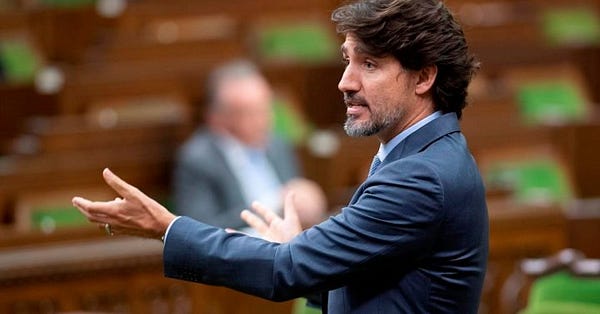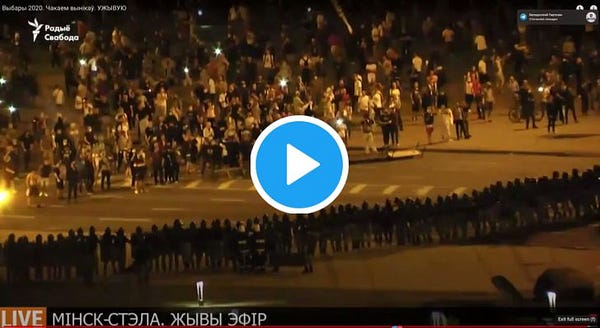Canada's Belarusian cock-up
The Trudeau government reset relations with a dictator. How did that go?
You should get this newsletter delivered to you automatically because you have enough to do already.
Will political violence in Belarus cause a rethink among Canadian Liberals?
Violence has broken in the streets of Minsk, as police crackdown on street protests following voting in the Belarusian presidential election.
Belarus state television reported that Alexander Lukashenko — known as Europe’s last dictator — received 80% of the vote, with his main opponent receiving just 7%. That opponent, Svetlana Tikhanovskaya entered the race in her husband’s place after he was jailed and prevented from registering to contest the election. Lukashenko has occupied the Presidential office since 1994.
The contentious preliminary reporting of election results comes after significant protests in the run-up to the vote.
Canada curtailed diplomatic relations with Belarus in 2006 in one of the Harper government’s first decisions, shifting Canada’s policy in the region after international observers raised concerns about ballot fixing and the jailing of political opponents after the 2006 Presidential election in Belarus.
In 2016, the Trudeau government decided to reverse the Harper government’s decision, softening Canada’s stance against the Lukashenko regime and removing the country from the Area Control List — allowing trade between Canada and Belarus once again.
[The] policy decision to re-engage diplomatically with the government of Belarus was taken in 2016. This shift followed a ten-year period during which official relations were limited following the flawed 2006 presidential elections, which included the harassment and intimidation of the opposition, and the subsequent suppression of protests by Belarusian authorities. Canada's current approach to Belarus seeks to recognize the modest progress, including the conduct of peaceful presidential elections in October 2015, and in particular the constructive role played by Belarus in facilitating negotiations toward a ceasefire and peace agreement in Ukraine under the Minsk agreement.
Liberal foreign affairs staffers had been pushing Belarus as a gateway to Russia and China; pushing for Canada to diversify its trade outside of the American sphere.
One former Conservative foreign affairs staffer has offered his reaction.


Liberal Government Dumps WE Documents
Back home, the Liberal government has released 5,000 pages of documents to the House of Commons Finance Committee. The documents relate to the government’s decision to provide a sole-source contract to the WE network to handle the distribution of $912 million of funds earmarked for the Canada Student Service Grant.
The Parliamentary lawyers will first review the material to blackout any sensitive/private information and then the Finance Committee will have access to work-over the documents. This will likely result in additional inquiries from the committee and a desire from opposition members to question additional witnesses.


Meanwhile, we note that the Prime Minister’s official daily itinerary has gone from “Personal” time since August 5th back to “Private meetings” today.
China continues pro-democracy crackdown with arrest of Jimmy Lai
Hong Kong media tycoon Jimmy Lai has been arrested under Hong Kong’s national security law for “colluding with foreign powers”. Lai, who is a UK citizen, runs Apple Daily which bills itself as “the most outspoken pro-democracy media in Hong Kong”.
Police also raided the offices of Lai’s news company after his arrest.
The arrest comes after a joint statement by the foreign ministers of Canada, the US, the UK, Australia, and New Zealand who expressed “deep concern” over Beijing’s imposition of the national security law in Hong Kong and grave concern over the disqualification of political candidates and postponement of legislative council elections.
I like writing this newsletter. I trust that you’re enjoying it as well. Would you share it with your smarter friends who’d appreciate this sort of content?







